All 3 candidates who qualified for Presidential Election face challenges ahead: Analysts
Ng Kok Song, Tan Kin Lian and Tharman Shanmugaratnam have qualified as candidates in Singapore's Presidential Election 2023, but George Goh was unsuccessful in his application.
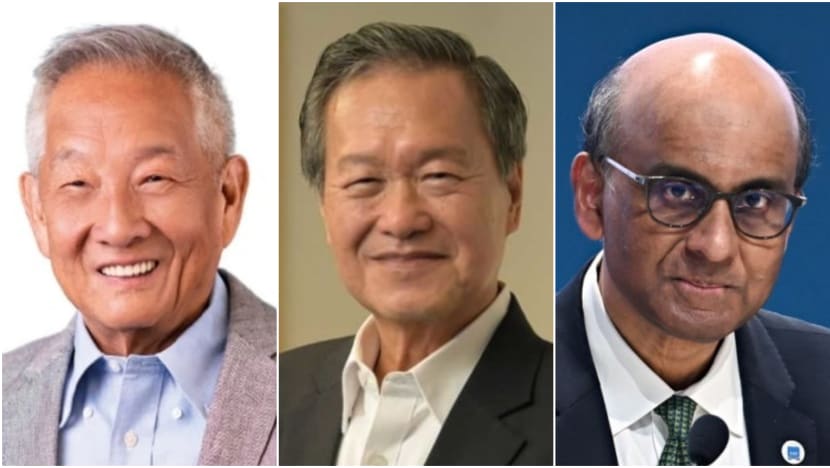
Former GIC chief investment officer Ng Kok Song, former NTUC Income chief executive Tan Kin Lian and former Senior Minister Tharman Shanmugaratnam have qualified as candidates for Singapore's Presidential Election. (Photos: Asia School of Business; CNA; AFP)
SINGAPORE: The three candidates who are vying to be Singapore's next president all face challenges ahead, with former Senior Minister Tharman Shanmugaratnam likely being the one to beat, said political analysts.
Earlier on Friday (Aug 18), the Elections Department (ELD) announced that Mr Tharman, former GIC chief investment officer Ng Kok Song, and former NTUC Income chief Tan Kin Lian have qualified as candidates for Singapore's Presidential Election.
However, Mr George Goh, founder of Harvey Norman Ossia, was unsuccessful in his application for a certificate of eligibility.
The certificate of eligibility certifies that the candidate is a person of integrity, good character and reputation, and meets the relevant public sector or private sector service requirements.
The next step for Mr Tharman, Mr Ng and Mr Tan is to be nominated as candidates. They must deliver their nomination papers – along with the certificate of eligibility, community certificate and political donation certificate – on Nomination Day on Aug 22.
If more than one candidate is nominated, Singaporeans will go to the polls on Sep 1, which will be declared a public holiday.
Related:
THARMAN LIKELY THE ONE TO BEAT
Political observer Felix Tan from Nanyang Technological University said that Mr Tharman is likely still the one to beat, given his popularity with the public and 22 years of experience in politics.
“Definitely, given all the circumstances, he might be the strongest candidate in this, but who knows?” Dr Tan added.
Dr Gillian Koh, senior research fellow at the Institute of Policy Studies, said it would be difficult for voters to resist Mr Tharman’s “unparalleled international standing”.
Nevertheless, Singapore Management University law don Eugene Tan cautioned that Mr Tharman’s biggest challenge is to ensure voters will cast their ballots for him, rather than assume his victory is a foregone conclusion and vote for either of the other two candidates.
If that happens, the race may become even closer than he anticipates, he said.
Associate Prof Tan added: “I think, given the seasoned campaigner that he is, Mr Tharman’s campaign will certainly emphasise his experience and ability across the three pillars that the president has a role and function – the custodial powers, the committee function, the ceremonial duties.
"And I suppose he will emphasise that voters should not take it for granted that he will win.”
Mr Tharman stepped down in early July as Senior Minister and Co-ordinating Minister for Social Policies and Member of Parliament for Jurong, as well as from all his government positions.
The 66-year-old was an economist and civil servant, mainly at the Monetary Authority of Singapore (MAS), before joining politics in 2001. He has served as Minister for Education and Finance, and was Deputy Prime Minister from 2011 to 2019.
He has also held prominent posts at international organisations including the International Monetary Fund, World Economic Forum and the United Nations.
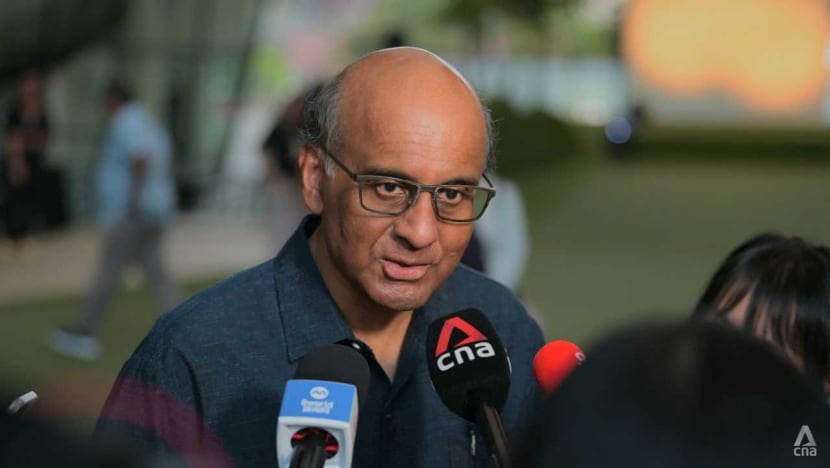
THREE CANDIDATES ARE "VERY DIFFERENT"
The analysts agreed that voters have a diverse slate of candidates to choose from.
“All three have a clear track record of making strategic decisions about managing large sums of funds. We also have a minority among the slate of three,” said Dr Koh.
Dr Tan noted: “Essentially if you look at all three, they are all very different in terms of character, personality, and what they have been driving.
“For Mr Ng and Mr Tharman, they are aware of the roles and responsibilities of the presidency. They are more in tune with the national reserves – the important agenda that everyone’s talking about.”
Assoc Prof Tan said Mr Ng will likely position himself as a “nice option between Mr Tharman and Mr Tan Kin Lian”, given his lack of affiliation with any political party.
He added that even though Mr Ng has acknowledged that he was part of the establishment through his years at MAS and Singapore's sovereign wealth fund GIC, his experience will enable him to understand how the national reserves work.
Mr Ng, 75, worked in the public service for 45 years, first in the Finance Ministry and then MAS, before becoming the chief investment officer at GIC.
As for whether Mr Ng will draw middle-ground voters away from Mr Tharman, especially Chinese ones in the heartland areas, Dr Tan said Mr Ng "might have some challenge" in connecting with such voters.
"While he is affable, he is also very polished, especially in the way he speaks ... On the other hand, Mr Tharman has walked the grounds and has experience in engaging with the Chinese heartland, especially during his term as MP for Jurong GRC," Dr Tan added.
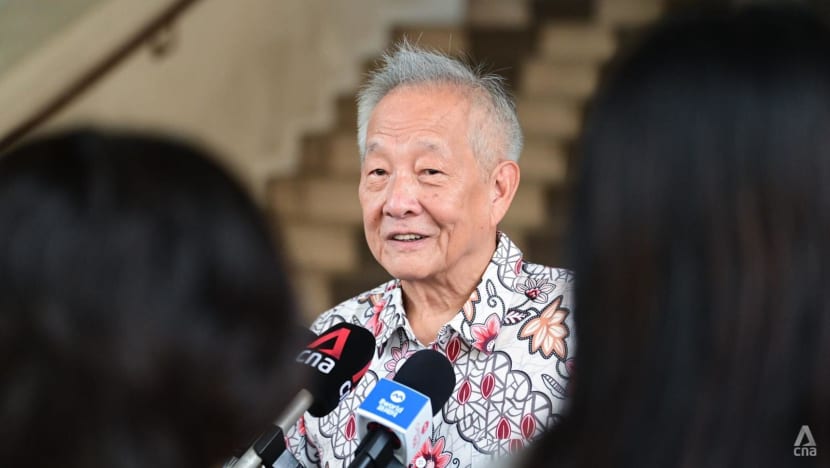
Meanwhile, Mr Tan – also 75 – was the CEO of NTUC Income for 30 years until 2007. After leaving the insurer, he started a computer software business and travelled regularly to provide insurance consultancy in Indonesia.
He was also a member of PAP for 30 years before leaving in 2008.
The analysts said Mr Tan needs to convince voters that he is serious about the presidential race and and go beyond touting himself as an "independent candidate".
In 2011, he unsuccessfully ran for the presidency and came in last out of four candidates, with 4.91 per cent of the more than 2.2 million votes. He lost his deposit of S$48,000.
“This is where his reputation may precede him – his reputation of being the only candidate to ever have lost his election deposit in a presidential campaign,” said Assoc Prof Tan.
“He urgently needs to demonstrate that his campaign is relevant to voters’ choices – that he is not there to make up numbers or to try to educate for a vision of the presidency that can never exist.”
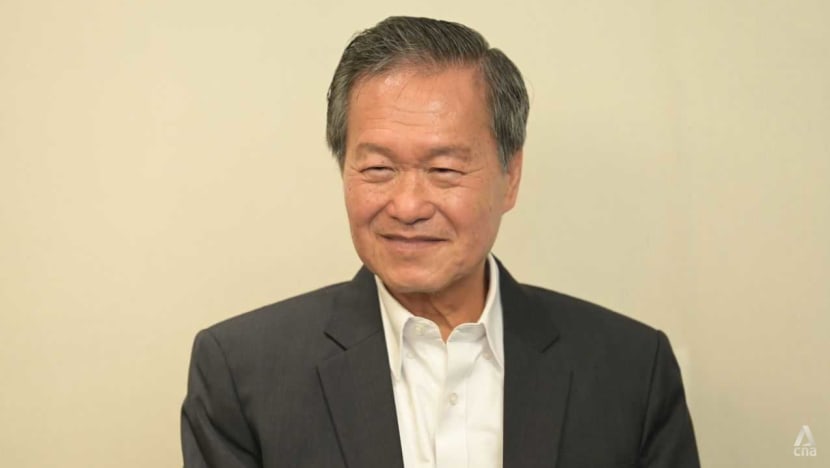
Mr Tan previously said he wanted to influence government policy with regard to the cost of living, housing and jobs.
“The Constitution doesn’t provide the President with those sort of powers … I think if generally, voters know what the President can or cannot do, if he continues in this particular vein, he’s not going to be able to make a strong case for himself,” Assoc Prof Tan added.
Assoc Prof Tan also said Mr Tan needs to go beyond talking about being a “so-called independent candidate”, given his past affiliations with PAP and NTUC Income, with NTUC having a “symbiotic relationship” with PAP.
Dr Tan said that with Mr Goh out of the presidential race, Mr Tan might try to “take up a lot of Mr Goh’s points and utilise them in his campaign”.
He further noted that being anti-establishment has always been part of Mr Tan’s strategy, which may win some Singaporeans over to his side.
“The circumstances already help him in this particular instance but I think he also needs to work a lot harder to be able to reach out to others who might still not be convinced of his ability or his capability,” Dr Tan added.
GEORGE GOH
Meanwhile, in a statement to the media on Friday, Mr Goh said the Presidential Elections Committee (PEC) rejected his legal and financial team's argument that his experience in managing his five companies "was equivalent to that of a CEO running a single company".
The PEC also "took a very narrow interpretation of the requirements without explaining the rationale behind its decision", he added.
Questions had been raised about whether Mr Goh would meet the eligibility criteria, with lawyers telling CNA that it was up to the PEC to decide.
To meet the private sector service requirement to be President, an applicant must have served as the chief executive of a company for at least three years. During this time, the company must, on average, have shareholders' equity of at least S$500 million and made profit after tax for the entire time.
Earlier this month, Mr Goh said he has a group of five companies with a combined shareholders’ equity of S$1.521 billion over three years, and reiterated that he was confident of qualifying under the private sector "deliberative track".
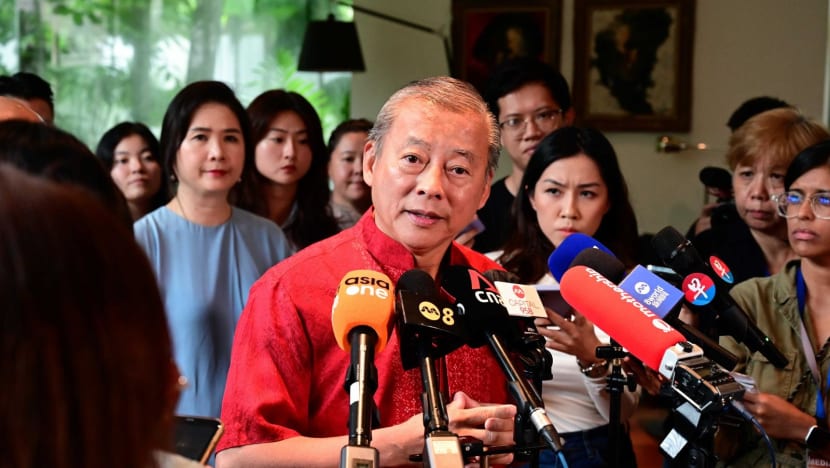
Assoc Prof Tan, the political observer, pointed out that Mr Goh had to persuade the PEC that his experience would provide him with comparable experience and ability, in order to exercise the President’s custodial powers.
“It would appear the PEC didn’t agree. I think this is quite understandable,” Assoc Prof Tan added.
“Running one S$500 million company is quite a different thing from running five much smaller companies, even though when you add up, their average shareholder equity is S$500 million. I think the magnitude is quite different.
“The other way, to put it very dramatically, is: Running one S$500 million company is quite different from running 500 S$1 million companies.”
Dr Koh noted that the PEC’s decision sends a signal that it is more difficult for the committee to stretch the deliberative criteria in that direction, and it is useful to note for future reference.
Dr Tan said he thought it was surprising that Mr Goh failed to qualify, but acknowledged that the eligibility criteria are “very stringent”.
“Some of us were hoping that he might qualify given the circumstances of what he has put forth, so I think there was an expectation that he would qualify or at least be able to qualify,” Dr Tan added.
“But I think many were also being realistic that given the situation and given how stringent the criteria were, Mr Goh’s disqualification in this was also, in a way, expected as well.”
Dr Mustafa Izzuddin, a senior international affairs analyst at business consultancy Solaris Strategies Singapore, also said that Mr Goh's failure to qualify was "somewhat surprising".
"It would have been more enriching if Mr Goh had qualified as well, because he brings something different and unique to the table and in so doing, provide the voters with an additional choice to consider," he added.












_0.png?itok=FRQ8-JfF)









